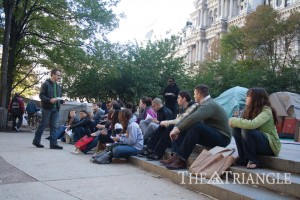Students in one History of Political Thought class at Drexel University had the chance to voice their opinions about the Occupy Philly protests directly in front of demonstrators at City Hall Oct. 17.
The discussion, led by George Ciccariello-Maher, assistant professor in the Department of History and Politics, analyzed the possibilities, difficulties and tensions the demonstrators will have in enacting change as the Philadelphia section of the international protests finishes its second week.
“I like to remind my students that whenever they act politically, they are embodying political thought, even if they don’t recognize it in the moment,” Ciccariello-Maher said.
Standing in front of City Hall, among tents, onlookers and demonstrators, Ciccariello-Maher encouraged students to debate their opinions of the protest and encouraged bystanders to partake in the discussion.
“Within our class there were clearly divergent viewpoints,” Ciccariello-Maher said. “While largely sympathetic, some felt the protesters lacked a single and unified message. Despite this, however, several messages stood out: opposition to corporate control over the democratic process being the central thread.”
He noted that several onlookers with varying viewpoints stopped to listen to the debate, even offering input and asking questions that brought about further debate.
“I was seeking to remind my students that their debates and discussions about political theory do not exist in a vacuum,” Ciccariello-Maher explained as the reason for hosting his class during the protests.
His class analyzes political thought through the lens of violence, and previous class discussions brought up Marx’s depiction of violence in the capitalist mode of production. This particular Monday session discussed Gorges Sorel’s account of working-class violence, according to Ciccariello-Maher.
“Given the debates on capitalism and violence prompted by the Occupy movement of the 99 percent, the location seemed particularly fitting,” he said.
Overarching themes of conflict and negotiation were also brought up during the class. Students discussed violence in the context of the Occupy Philly protests and how Sorel would interpret violence in this capacity.

Ciccariello-Maher also referenced how the political world is in a constant state of motion and the influence this fact has on how individuals think politically.
“In moments of crisis such as the present, however, this motion speeds up as time is compressed. Dramatic shifts can be accomplished in a matter of days or weeks, and this is what the Occupy movement has demonstrated,” he stated.
Ciccariello-Maher is a proponent of integrating politics and thought more heavily at the university level.
“At a university which prizes student engagement like Drexel [does], I think it’s essential to place students in spaces where politics and thought are moving together,” he said.

